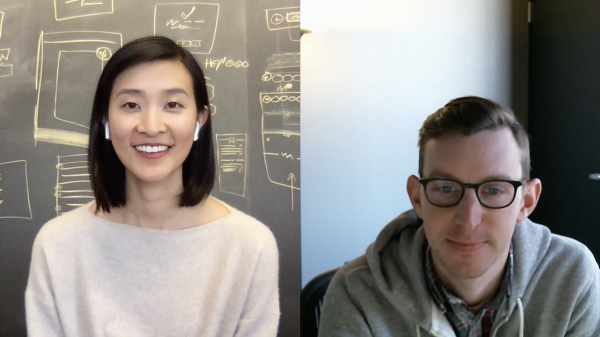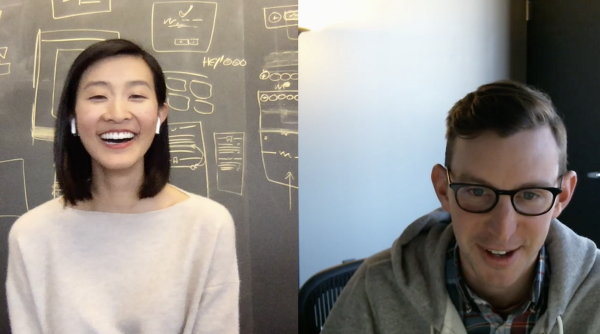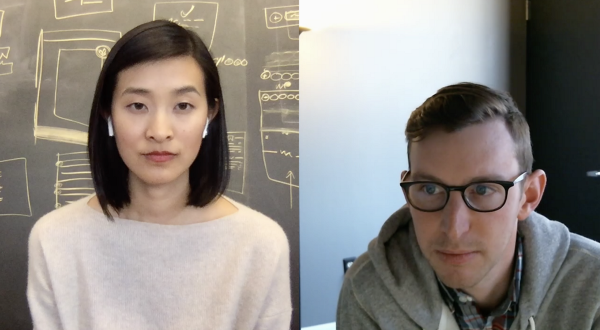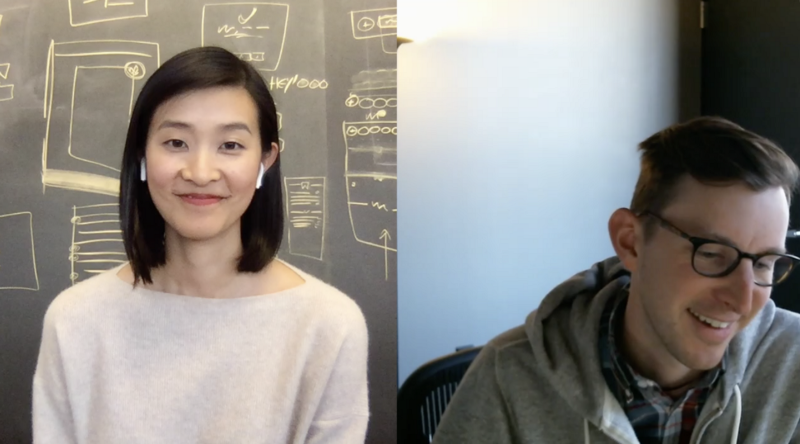Daniel Houghton is the CEO of Lonely Planet, the largest travel guide book publisher in the world. As a 29-year-old CEO with almost 400 employees across five different continents, Daniel shares how it is personal skills, more than anything, that has helped him survive and thrive as a leader.
Claire: Hi everyone! I’m Claire Lew, and I’m the CEO of Know Your Company, and today we have with me a really special guest. We have the CEO of Lonely Planet, Daniel Houghton, and Daniel and I met … I want to say last year? Over dinner.
Daniel: Last summer, yeah.
Claire: Yeah, last summer, exactly. And I was so impressed by Daniel’s story. He took over as the CEO of this huge travel book company when he was 23 or 24 years old, and his first task that he faced and that he shared, actually, at dinner, was having to lay off 75 people. And so Daniel’s definitely been through a lot.
He’s also really taken the company to really big things. I was reading that you guys have improved tremendously in both digital and in print, and the company was originally struggling when you first took over.
So just honored to have you here, Daniel, and excited to learn from you.
Daniel: Thanks for having me.
Claire: Sure thing. So I’ve got this one question, Daniel, that I’ve been asking everyone about leadership. I want your take:
What’s something you wish you would have learned earlier, as a leader?

Daniel: Mine is probably very obvious… But probably just some actual sort of core business school-style skills. I know that sounds really wacky. I have an arts degree. I have a Bachelor of Arts degree, so I had no formal training of any kind, you know. I didn’t go to business school. I don’t have an MBA. Yeah, so that would have helped the baptism by fire. To avoid that. Getting up to speed.
My instinct was to say accounting, ’cause as a manager, you spend so much time looking at numbers and I guess just data and analytics. So that was a learning curve for me, probably more than anything.
Most of the sort of interpersonal skills or emotional intelligence-style skills I think I did okay with. I’ve always got along with a lot of people. I used to be a journalist. You have to work with different people every day, telling their stories for a living.
Claire: Yep.
Daniel: So all that was fine, and then you know — I say that. I just spent a week at Harvard Business School as an executive education program, and it was an incredible week. I didn’t know how much I was going to get out of it, but, not that it was a beginner course to business or anything. It was pretty advanced stuff, but it was fascinating and I love education. So if I could have like hit the pause button and gone and gotten, or spent some more time you know, on some of that stuff… Probably that’s what I would have done.
Claire: That is in some ways, it’s refreshing, actually, to hear. I think you, of all the interviews I’ve done — and I’ve done quite a bit of these — I think you’re the first person to admit that. I think a lot of us, honestly, as CEOs and managers feel that way. Like, “Was there some book I was supposed to read? Was there some school I was supposed to go to learn this stuff?”
So I guess my question is, well how did you end up learning this stuff? What would you say, aside from accounting and core business skills were, and then how did you try to ramp up your education around them? Was it finding mentors? Was it taking online classes? Was it just Googling the shit out of something? That’s what I do, like when I don’t know something, I’m on Google,: “How much do I pay …”
Daniel: Yeah, there was a lot of searches. No, I mean, luckily there’s a lot of really talented people in the business. I mean, our CFO basically taught me accounting, taught me how to read, you know … Day one.
Claire: Yes. Yes.
Daniel: Absolute true story. The rest of it, I just kind of had to pick up as I went along, from a bunch of different methods. I do love to read and I read a lot of books. Also, if you hire the right people, you don’t have to know how to do everything, but you do need to be able to learn from those people. So that, and then a whole laundry list of mentors, as you can imagine, and yeah.
You just have to have a desire to learn, if you’re going to function in a role like that. Or it’s going to be over pretty quick I think.
Claire: Absolutely. So Lonely Planet today — we were chatting before this, you were saying — is almost 400 people, right? You’re spread out across five different continents. When you first became CEO, and you knew that okay, maybe I haven’t been to business school. I don’t know some of these things… What was sort of your first approach to trying to gain that knowledge from folks? Or what did say to employees ? I mean, was there apprehension, right, about you coming on board? And how did you sort of negotiate that sort of early transition?

Daniel: Yeah, I think there was probably a healthy amount of apprehension, and there probably would have been from me, too, if I was in that position. Yeah, I mean I honestly didn’t spend that much time thinking about. There was too much kind of to do.
Claire: Yep.
Daniel: So you know, you kind of tackle a little bit of it every day and figure it out as you go. Or not, and then you drown, and it doesn’t work.
Claire: Yes.
Daniel: Hopefully.
Claire: We’ve all been there, yeah.
Daniel: The alternative, really, is that it doesn’t work and that’s not good for anybody. Especially your employees. So yeah, I mean it wasn’t something that I came out and said, “Obviously I have no business education, but here I am.”
But tried to have, and still try to have, a real … I don’t know, culture of… that ideas can come from anywhere, and that they’re welcomed and that they’re heard. Doesn’t mean that they’re necessarily followed. We can’t follow every idea, but we try to listen to them all, and at least give some feedback.
Claire: Absolutely. So for new managers and here there’s a lot of folks who follow The Heartbeat who are getting promoted for the first time into an executive role, and have a little bit of imposter syndrome around the fact that many of us, including myself, you know, have never been to business school or haven’t had quote-on-quote “the formal education”.What advice would you give to folks? And I know you’ve touched on this a little bit, but you know, any sort of recommendations. Do you feel like everyone then needs to go to business school or needs some sort of formal education necessarily? What’s your advice to new managers and incoming executives?
Daniel: No, I don’t think everyone has to do anything. Everyone learns in a different way, and people are at all different levels of preparedness when they get put in roles like that.
Claire: Sure.
Daniel: I think the worst thing that could happen is someone could think that they’re “too prepared”.
You know, there’s a lot of people that have been to business school and are way smarter than I’ll ever be, but they can’t even talk to people. Or they actually can’t stop talking long enough to listen, which I think more important. That’s the only way that I’ve survived, is just personal skills, and I don’t think that gets talked about as much as kind of the other pieces of it do.
So I would try to focus on that. It doesn’t have to be a mentor someone that’s been in that role, but you have to have people that you can turn to that will be really honest with you, and that can give you some feedback, whether or not they have expertise in your industry or maybe they’re not even a business person.
I didn’t grow up playing football or other organized sports, but one of my best mentors is a long-time football coach, of kind of young kids and middle school and stuff, and high school. You can learn a lot from people that have just been around all different kinds of people their entire lives, and understand how people think. Don’t think it has to come out of some MBA program or something like that, or they have to be an ex-CEO mentor.
Claire: Right.
Daniel: You’ll be surprised, kind of, what you can find, and learn from other people.
Claire: Absolutely. Well, I think when I reflect on that, some of the greatest business lessons I’ve learned are from you know, my parents.
Daniel: Yeah, me too.
Claire: Or you know, from my brother, my younger brother, or you know from neighbors. I think there’s definitely a fallacy or a myth around this idea that there’s some leadership education you get a certificate for and then you know x, y, and z. So I appreciate you sharing that, encouraging folks to have just an openness to learn from wherever that learning might come from.
So one thing you touched on, Daniel, was this idea that it’s the people skills. You said the people skills that don’t get talked about enough in leadership, and that that’s been the only way you’ve been able to survive, in a lot of ways, or thrive. So tell me about that. What do you think, as leaders, we overlook when it comes to people skills? And what do we need to be focusing more on?

Daniel: Yeah. I think it’s really important to try to put yourself in other people’s shoes, which is easier said than done. You think that you can, but you don’t really know what’s going on, and most of it’s none of your business.
Claire: Yeah.
Daniel: You know, in their life. But as much as you can imagine yourself in that sort of position, and try to think about what it must be like to present to you or to be trying to get something across the line. You know, the hardest conversations are when you believe in the idea but you know you just can’t do it, for whatever reason it is.
Claire: Right.
Daniel: And so I think if you can put yourself in other people’s shoes, and I guess really try to understand what motivates people. It’s fascinating when you start paying attention and try to understand what makes people tick.
Claire: Yes.
Daniel: That helps you understand why some people only ever care about what the next promotion is, whereas some are really happy in their jobs as long as we’re moving forward.
Different people value different things, and I think some organizations tend to value employees only in one way, if they value a certain set of things, and it’s good to have a good mix of that in any organization. It doesn’t matter if it’s a baseball team or a giant global business.
Claire: Right.
Daniel: Obviously diversity of all kinds is important, but when it comes to personalities, I think it’s really, really important.
Claire: Absolutely. So one thing I talked about at the very beginning of this interview, and that I mentioned because I will always remember this story that you told over dinner: Of having to execute a bunch of layoffs as one of your first tasks as CEO. Tell me about what you’d recommend for other CEOs and managers who are facing the same situation, or maybe not at that scale, but of …
Daniel: It’s bad, whatever scale it’s at.
Claire: Yeah, absolutely. How did you try to think about handling that? Are there things you wish you would have done differently? Were you proud of the way you handled that situation? I think everyone who’s in a leadership role is hungry for so much advice around the right way to let people go.

Daniel: Yeah. I am proud of the way that I handled it, because I did everything that I could. You’d sort of always say, “Tell the truth as much as you can.” Well, that’s obvious, but sometimes there’s things you can’t say, or you can’t share, but you try to do as much as you can.
That’s not so that other people see your point of view and then “get it”, it’s just so that if that’s going to go on, as many circumstances as you can help them understand or you know, to the group. Sometimes the people that you’re letting go, you may have this like big speech prepared, and you realize a couple seconds into it that it’s just set in and they’re now shocked and actually you just need to shut up now, ’cause it’s over.
Claire: Yeah.
Daniel: And sometimes people need some space. You know, I’ve never been let go. I have no idea what that feels like. It feels really shitty on both ends, I’m sure.
You have to read the situation. But then to the people, when you try to explain it to the rest of the staff, as much information and honesty as possible goes a long way, a really long way. And that may sound like common sense but I think there’s organizations, a lot of times, where those things happen and there’s not actually a lot of explanation as to why it happened. You don’t have to get into why these specific people, or you know, but you do have to address kind of the overall situation, and it takes a much longer than you think it’s going to, if it’s more than a couple people.
If it is any percentage of your organization, of any size, whether you’re again a ten-person company or a thousand, you got to spend way more time than you think that you do with the team, helping them understand you know, what’s going on.
Claire: Absolutely. Well, I love that thought, to err on the side of more honesty and transparency. It’s natural instinct around any tense decision, we have a habit of closing up, right? And thinking that it’ll gloss over or we’ve said enough.
Daniel: And it will, but that doesn’t mean that it’s the right way to do it.
Claire: Right.
Daniel: Yeah, and it can damage your organization a lot, if you do that, do things that way.
Claire: Absolutely. Well, thank you so much for being so candid and sharing with us, and the lessons you have learned.
Daniel: Sure,.
Claire: It’s been awesome to see everything you’ve done with Lonely Planet, what a great company it is, and thanks so much again, Daniel.
Daniel: Thanks for having me.
